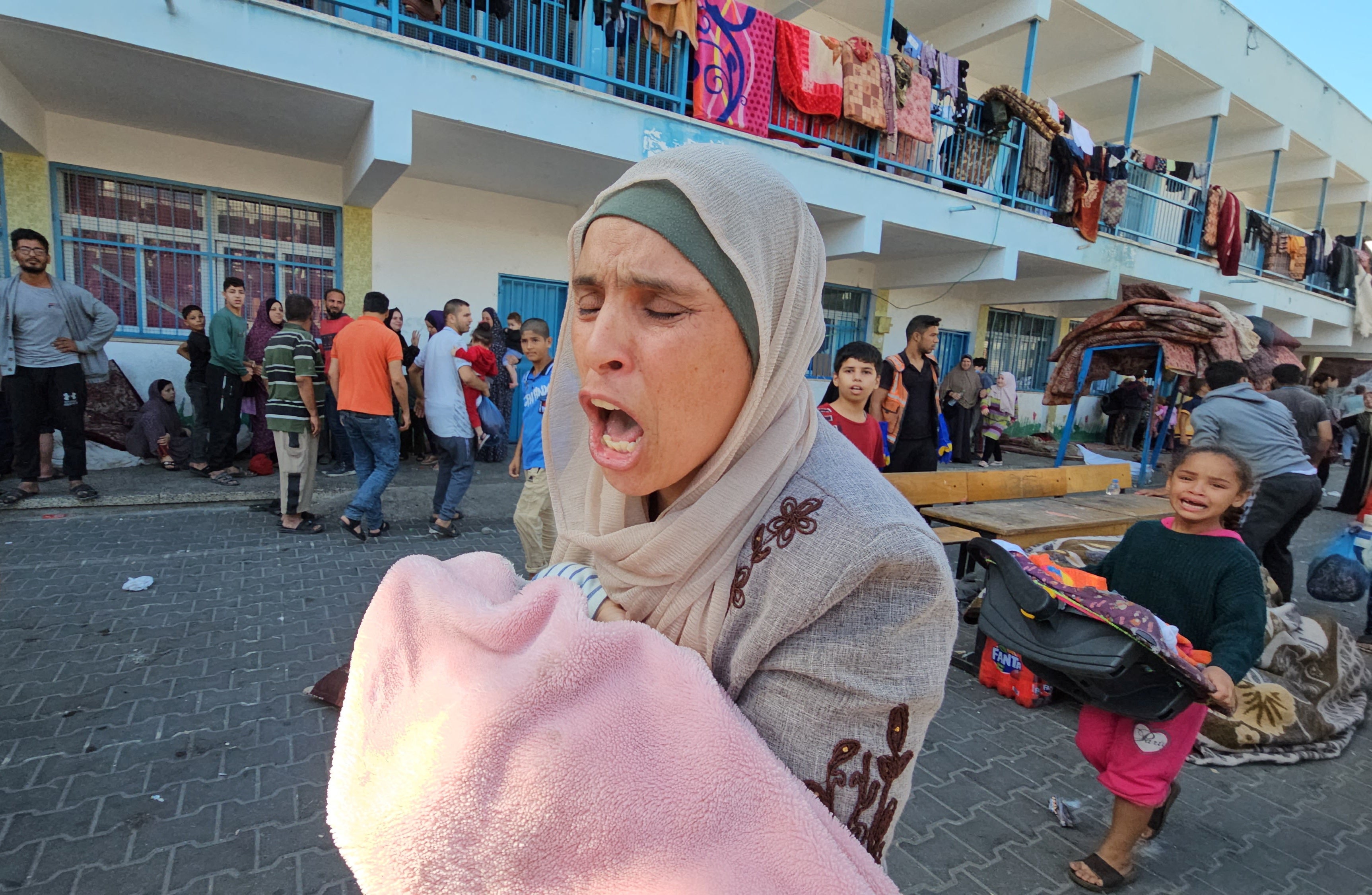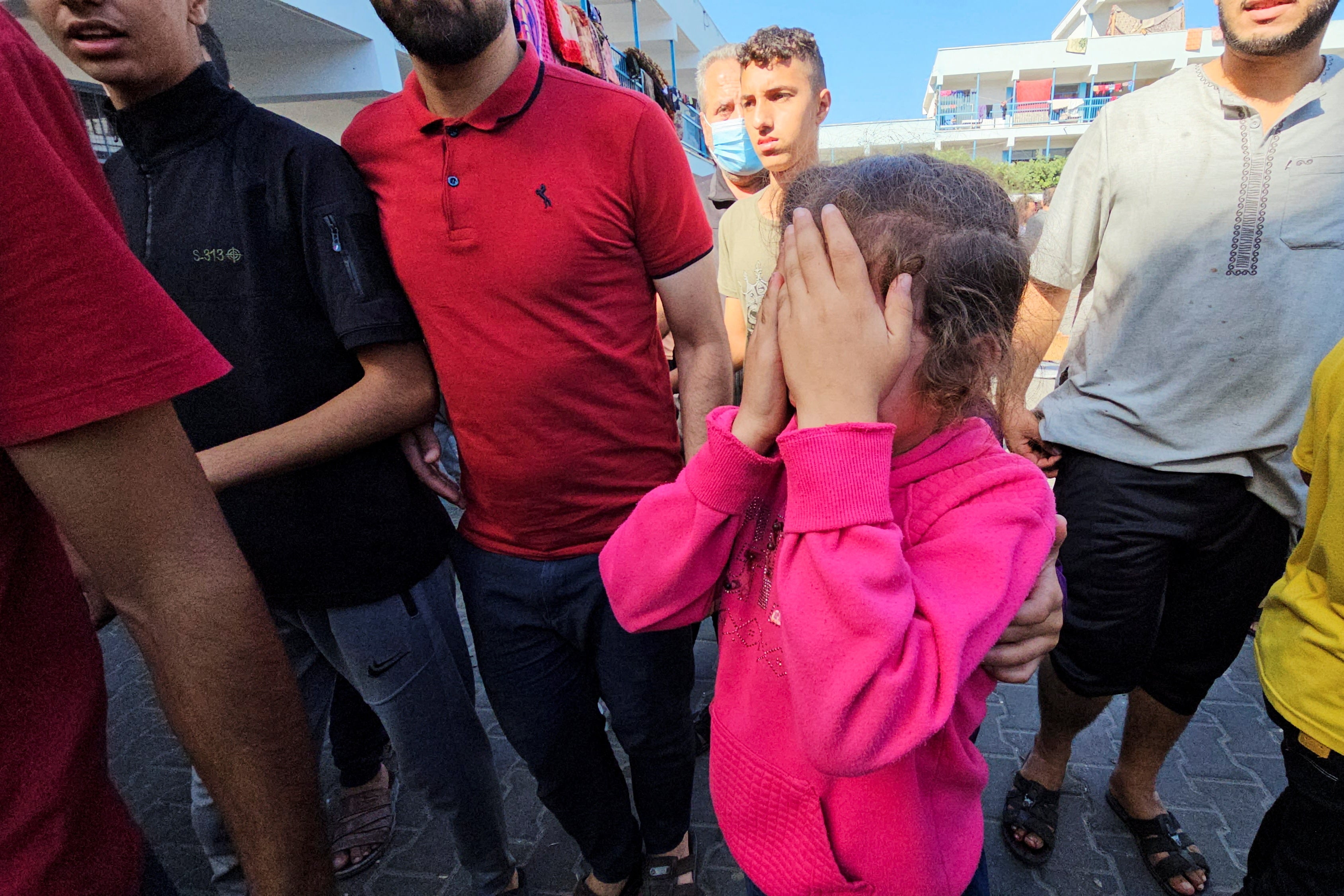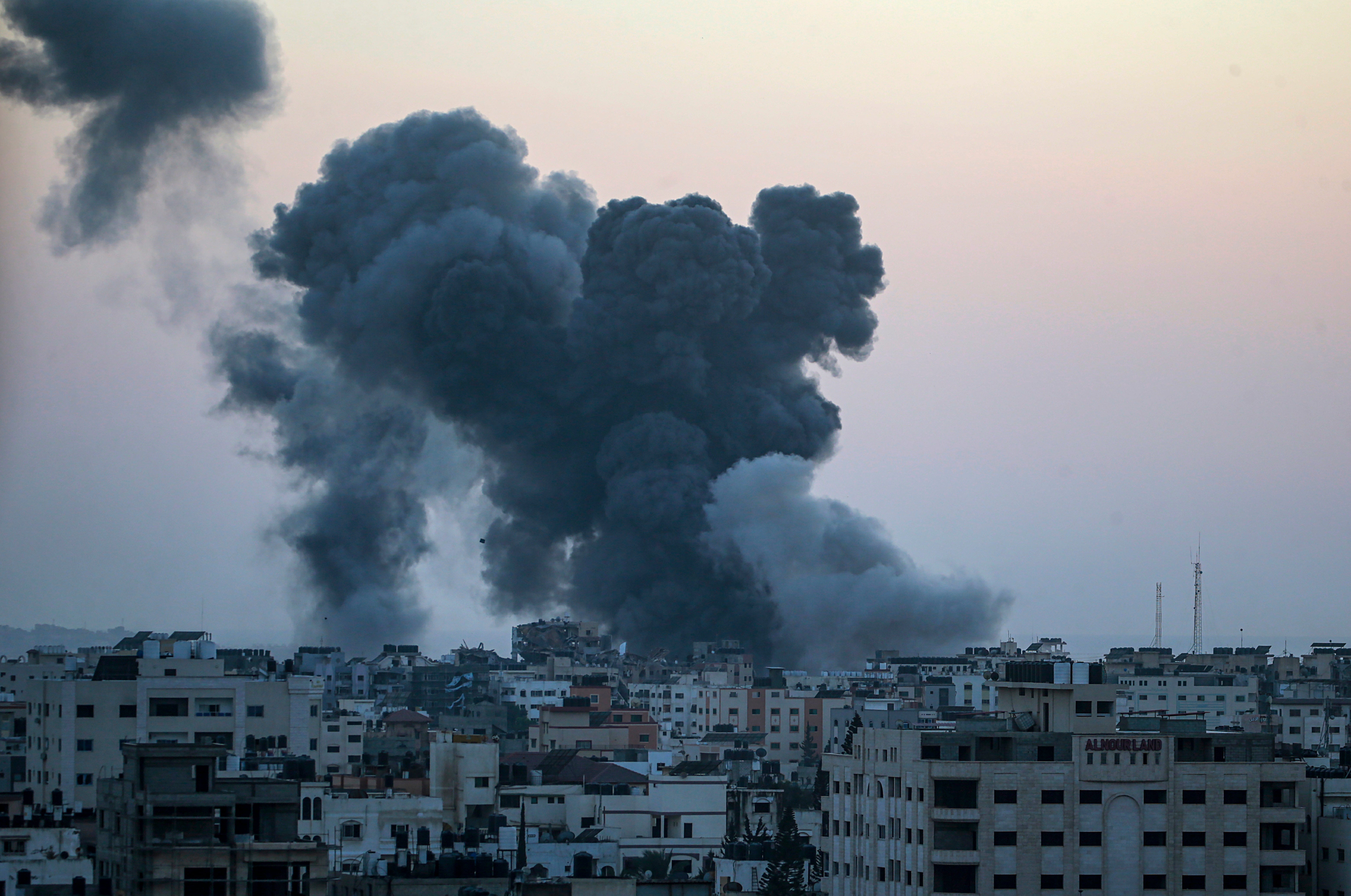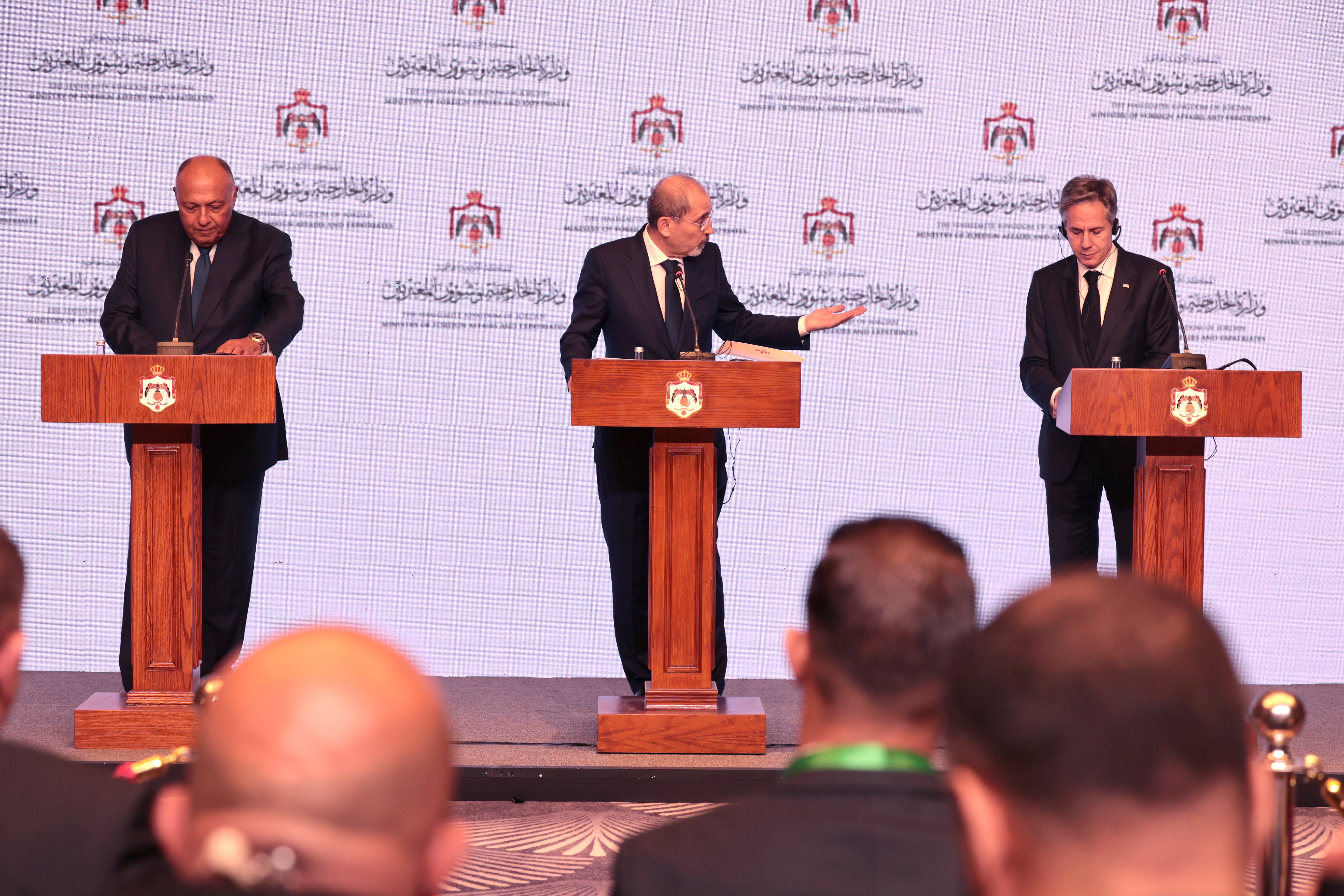Schools and hospitals hit by strikes as Israel snubs US warnings with increased attacks in Gaza
Prime minister Benjamin Netanyahu has ignored calls from the US that Israel risks losing hope of an eventual peace deal unless it eases the humanitarian crisis in Gaza
Intense airstrikes by Israel on Gaza have damaged United Nations schools, hospitals and ambulance convoys, despite mounting pressure from the US and Arab states for Tel Aviv to allow humanitarian pauses.
Israeli prime minister Benjamin Netanyahu snubbed blunt warnings from Antony Blinken, the US secretary of state, on Friday that Israel risks losing any hope of an eventual peace deal with the Palestinians unless it eases the humanitarian crisis in Gaza.
A day later Mr Blinken, who has called for “localised pauses” in fighting over a blanket ceasefire, travelled to Amman, the capital of Jordan, to frantically lobby support from senior regional officials, who remain angry and deeply suspicious of Israel as it intensifies its war against Hamas.
In a rare public disagreement at a news conference, the foreign ministers of Jordan and Egypt, standing alongside Mr Blinken, repeatedly pushed for a total cessation of hostilities, saying the death of thousands of civilians could not be justified as self-defence.

Health officials in Hamas-run Gaza said more than 9,250 Palestinians have been killed during the last month of war.
The United Nations Relief and Works Agency (UNRWA) for Palestinians said at least five UN schools, sheltering displaced civilians, have been damaged in strikes in the last 48 hours, killing more than 40 people according to initial reports. The latest was a school in Jabalia refugee camp in the north of Gaza which was hit twice on Saturday, killing as many as 15 people including children, according to the health ministry.
The Independent asked the Israeli military for comment but has yet to receive a reply.
The World Health Organisation said that on Friday three hospitals and an ambulance convoy have come under fire, killing and injuring dozens of people, attacks it said might “violate international law”.
Gaza’s health ministry said two more people were killed on Saturday in a strike by the gate of Nasser Hospital in Gaza City, now the heart of the combat zone.
“At least one strike hit the school yard where there were tents for displaced families,” Juliette Toma, a UNRWA spokesperson said of Saturday’s strike on the UN school. “Another strike hit inside the school where women were baking bread.”

The Israeli army has pounded Gaza from the air and sea, imposed a crippling siege and launched a ground assault, in retaliation for a deadly attack by Hamas on southern Israel when militants killed hundreds of people and took dozens hostage.
One month in, the widening offensive in Gaza has stirred global alarm as humanitarian conditions in the strip collapse: food is scarce and medical services are shuttering.
Civilians have told The Independent of risking their lives to queue for bread for hours, and drinking dirty water. Doctors have spoken about operating without anaesthetic and using washing up liquid to clean wounds.
Israel has repeatedly ordered Palestinian civilians, including the wounded in hospital, to evacuate to the south of the country, as it has intensified its strikes and pushed ground forces deeper into the besieged area.
US special envoy David Satterfield said that while up to 1 million people had moved to the south of the Gaza Strip, some 350,000 to 400,000 still remained in northern Gaza City and its environs that have now become an intense combat zone.
The United Nations has said for many, especially the wounded in hospitals, evacuating would be impossible. The Palestinian Red Crescent said Israeli forces hit a convoy of ambulances trying to head south twice on Friday resulting in dozens of deaths and injuries. Israel claimed responsibility for the attack saying they were targeting Hamas operatives that were hiding in ambulances.

But it has raised serious concerns about safe routes out for civilians.
Israel said on Saturday it would try to open a humanitarian corridor for civilians to evacuate from the north along central Salahuddin road after multiple reports the central and coastal roads to the south have been hit by Israeli tank fire and airstrikes.
Israel said the Saturday corridor attempt failed after their forces were attacked by Hamas militants.
Hamas “exploited the humanitarian window that the IDF provided to residents of the Gaza Strip to move southwards, and the terrorists fired mortars and anti-tank missiles at IDF troops who arrived and operated to open the route”, the army said.
Saturday’s meeting with Mr Blinken was convened by Jordanian foreign minister Ayman al-Safadi, who said the gathering was organised “in the context of their efforts aimed at stopping the Israeli war on Gaza and the humanitarian catastrophe it is causing”.
Washington has tried to speak with Israel, Arab states and international organisations on the future of Gaza and has dismissed ceasefires in place of seeking localised humanitarian “pauses”.
“A ceasefire now would simply leave Hamas in place, able to regroup and repeat what it did on October 7,” Mr Blinken said on Saturday as he engaged in frantic diplomacy in the region. He added: “No nation, none of us would accept that ... So it is important to reaffirm Israel’s right and its obligation to defend itself.”
But both Jordanian foreign minister Mr Safadi and his Egyptian counterpart Sameh Shoukry appeared reluctant to openly discuss those conversations and instead zeroed in on the need for a ceasefire.
“The international community’s responsibility always is to seek the cessation of hostilities, not promote the continuance of violence,” Mr Shoukry said. “I think we need to get our priorities straight. Right now we have to make sure that this war stops.”

Mr Safadi added: “What happens next – how can we even entertain what will happen in Gaza when we do not know what kind of Gaza will be left.”
Arab states are also concerned by the risk of the conflict spreading into the region.
Lebanon’s Hezbollah and Iraqi Shia militias backed by Iran have both launched attacks on Israel since 7 October, while Tehran-backed Iraqi Shia militias have been firing on US forces in Iraq and Syria.
Lebanon’s caretaker prime minister, Najib Mikati – who was the first to meet with Mr Blinken – stressed the urgent need for a ceasefire in Gaza. Mr Mikati also said “Israeli aggression” in southern Lebanon must stop.
The US has grave concerns that Hezbollah, which has already stepped up rocket and cross-border attacks on northern Israel, will take a more active role in the conflict.
Hezbollah chief Hassan Nasrallah gave his first major speech since the 7 October attacks on Israel. He did not forecast his group’s greater involvement despite professing it was not perturbed by US attempts to deter it and threatened that the US would “pay the heaviest price” if it did not reign in Israel.
Join our commenting forum
Join thought-provoking conversations, follow other Independent readers and see their replies
Comments
Bookmark popover
Removed from bookmarks